Luxury brands flex: How athletes have become a surefire fashion statement
Their massive intergenerational reach, influence on social media and uncontroversial attitude have turned sports figures into gold for exclusive brands. That’s even more true in years when the Olympics take place, as in 2024
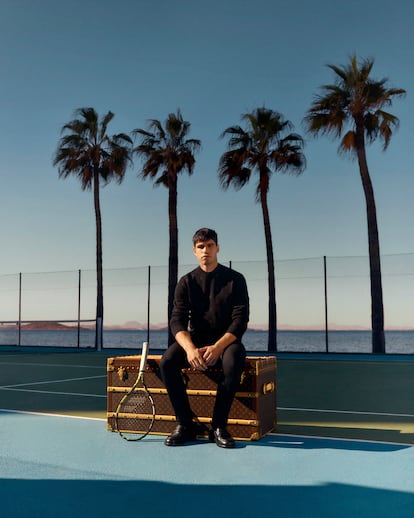
Of the €15.2 billion ($16.5 billion) in net profits it earned last year, Louis Vuitton Moët Hennessy will allocate about 1% to lend glamour to the Paris 2024 Olympic and Paralympic Summer Games. The amount of such a huge contribution is not official, because the French champion luxury group has not announced it publicly, but sources close to the negotiations between the holding company and the organization put it at around €150 million (almost $163 million), Agence France-Presse reported. That is not a bad amount for a budget of 4.4 billion. “France and Paris are such a potent association for luxury brands, it’s kind of a no-brainer for LVMH to want to be as involved as they can be,” The Business of Fashion website concluded upon learning of the premium sponsorship agreement [sic] reached last July, after months of arduous back-and-forth over the Olympics’ use of the brands that form the conglomerate. But this is not a story about money but about values.
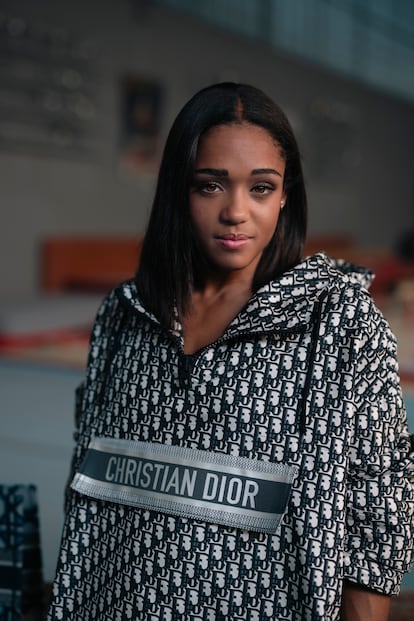
“LVMH as a partner will try to add a little touch of creativity, notably during the moments of celebration…[We] didn’t want to just be a financial partner. We wanted to have a role to play in the holding of these Olympic Games,” said Antoine Arnault, the chairman and CEO of the French emporium and the eldest son of its founder, the entrepreneur Bernard Arnault (the world’s second or third-richest man, depending on the ups and downs of the stock market). Arnault was speaking to journalists while attending the presentation of the agreement’s first milestone in February: the new medals that Olympians will receive will be made by the brand’s house jeweler, Chaumet. It is a given that the company’s champagne (Moët & Chandon) and cognac (Hennessy) will also be present at these moments of celebration. But this is a story with other protagonists, those who embody the values of the cause.
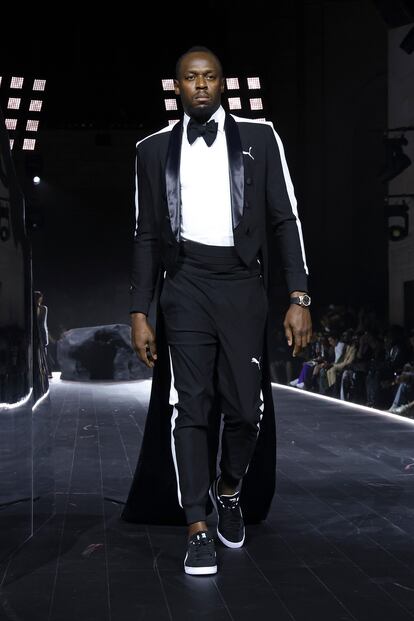
LVMH made its first Olympic splash in September by signing new sports figures as brand ambassadors. Swimmer Léon Marchand, five-time world champion; fencer Enzo Lefort, gold medalist at Tokyo 2020; gymnast Mélanie de Jesus dos Santos, four-time European champion in artistic gymnastics; tennis player Pauline Déroulède, French wheelchair tennis champion; and para-cyclist Marie Patouillet, who won two bronze medals at the last Paralympic Games. All of these athletes will be medal contenders for their countries, and they stood on Louis Vuitton (his) and Dior (hers) podiums as representatives of those “artisans of all victories” with which the luxury group is associated. Indeed, LMVH is a century-old supplier of trophies and custom-made trunks for high competition — from the World Cup to Roland Garros and sailing’s America’s Cup; it is no stranger to this game. Neither are its two flagships, which have long been using top athletes for their advertising campaigns. In addition to the usual soccer stars, the men’s division of Louis Vuitton signed Carlos Alcaraz as a brand ambassador in August of last year (the Spanish tennis player, the second-ranked player in the world, will make his Olympic debut in Paris), while Dior Men just added skateboarder Aurélien Giraud and surfer Kauli Vaast to its team.
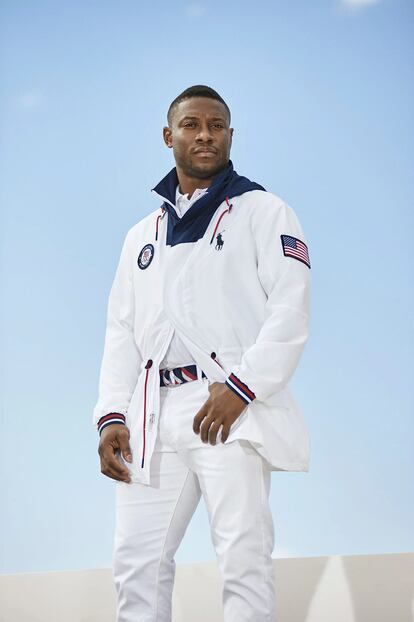
“Especially in fashion, the relationship between athletes and major luxury brands, has always been limited, if we are not talking about soccer players. With the exception of Rolex, few [brands] have used them as an image or claim. But social media has changed the rules: sports is a showcase for multimillion-dollar audiences, and athletes are the best asset for making a brand visible, reaching a greater number of potential consumers and gaining or strengthening [customer] loyalty,” says Sean Burke, an analyst at the Clarkston consulting firm. It is true that the clothing industry has a long history in the Olympic field, with kits designed by some of its leading lights (Issey Miyake for Lithuania for Barcelona 1992, Ralph Lauren for the United States since Beijing 2008, Stella McCartney for the United Kingdom in London 2012, Telfar Clemens for Liberia in Tokyo 2020), but its fondness for athletes in advertisements is a relatively new phenomenon (beyond the labels that are specific to their sports). We have seen them in Nike, Adidas and Puma campaigns (Usain Bolt was one of the models for the autumn/winter 2022-2023 collection that was shown in New York a couple of years ago). They are common in labels that have sporty roots, like Lacoste (for Paris, the German gymnast Marcel Nguyen was chosen as an ambassador). And there is even a legendary precedent: Jesse Owens wore a novel model of Dassler sneakers — the precursor of Adidas and Puma — to break records at the 1936 Berlin Games. However, it was not until athletes proved to be genuine content creators that they won over exclusive luxury brands.
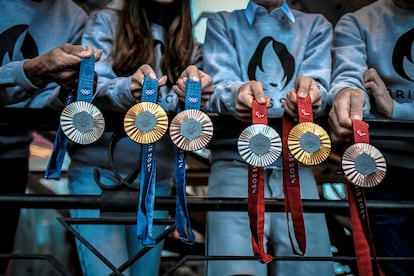
Prada understood this perfectly, so much so that to recalibrate its foray into the Chinese market it has prioritized athletes above the usual showbiz celebrities. After making table tennis gold medalist Ma Long an athletic ambassador, it signed shot putter Gong Lijiao, marathon runner Li Zhixuan, water polo player Xion Dungan and basketball player Yang Shuyu for its spring/summer 2022 campaign on Douyin (the original Asian TikTok), in a show of diversity that rendered non-normative bodies visible. That same year, Hugo Boss took a step forward by signing Italian tennis player Matteo Berrettini not only as a model/image for its Boss line, but also as a guest designer. At the last Wimbledon tournament, his fellow countryman and court-mate Jannik Sinner caused a viral sensation by walking onto the lawn with a Gucci monogrammed bag as the first non-soccer athlete to serve as an ambassador for the Italian brand. Here’s the thing: medal athletes not only attract crowds on social media, beyond the playing field, as positive examples associated with the sweat of self-improvement, but they are also less likely to cause a scandal than the usual suspects from film, television and music. It’s only natural that luxury brands would also want to be represented by them.
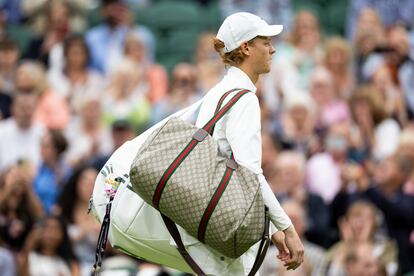
Sign up for our weekly newsletter to get more English-language news coverage from EL PAÍS USA Edition
Tu suscripción se está usando en otro dispositivo
¿Quieres añadir otro usuario a tu suscripción?
Si continúas leyendo en este dispositivo, no se podrá leer en el otro.
FlechaTu suscripción se está usando en otro dispositivo y solo puedes acceder a EL PAÍS desde un dispositivo a la vez.
Si quieres compartir tu cuenta, cambia tu suscripción a la modalidad Premium, así podrás añadir otro usuario. Cada uno accederá con su propia cuenta de email, lo que os permitirá personalizar vuestra experiencia en EL PAÍS.
¿Tienes una suscripción de empresa? Accede aquí para contratar más cuentas.
En el caso de no saber quién está usando tu cuenta, te recomendamos cambiar tu contraseña aquí.
Si decides continuar compartiendo tu cuenta, este mensaje se mostrará en tu dispositivo y en el de la otra persona que está usando tu cuenta de forma indefinida, afectando a tu experiencia de lectura. Puedes consultar aquí los términos y condiciones de la suscripción digital.








































